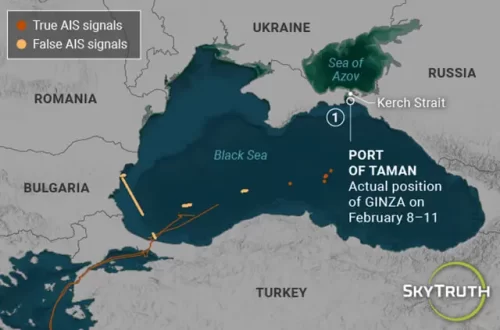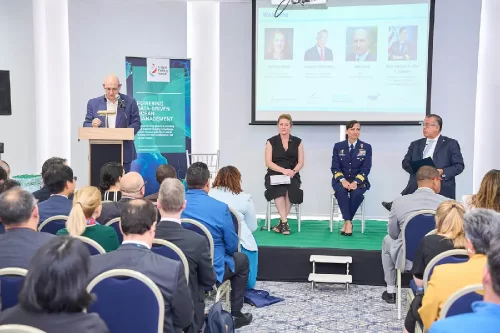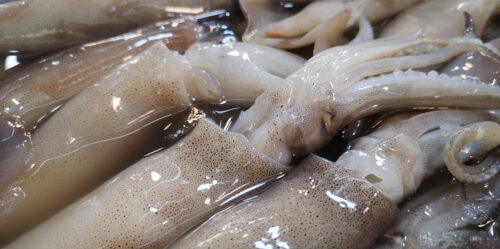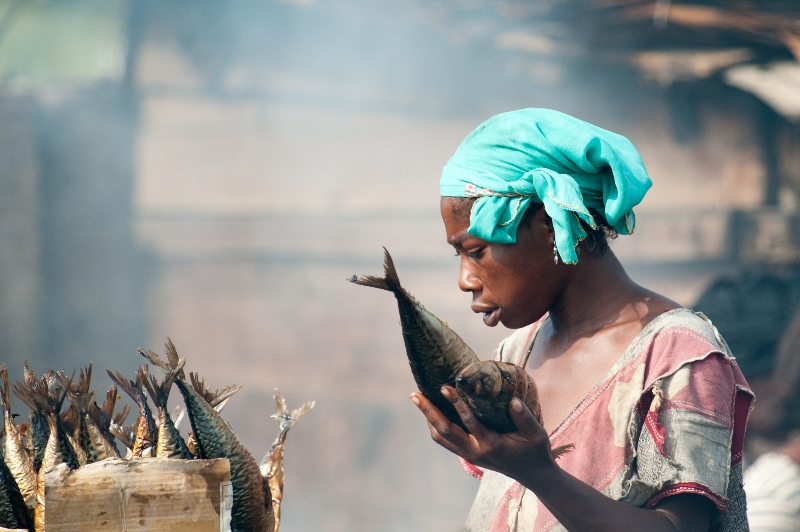
In West Africa, fishing, fish processing and fish selling are all part of life for many women. Roughly 6.7 million people directly depend on fisheries in the region, which have a landed value of 3.5 billion USD per year. Across West Africa, women form the majority of fish processors and make up a significant number of fish buyers and traders meaning that the industry has historically provided their financial and food security. But this security is under threat from large scale, commercial fishing operations by foreign-flagged fishing vessels and can only be protected through sustainable development of these fisheries. Responsible and sustainable fishing can also lead to better conditions for women in supporting the stabilization or even the growth of fish stocks near the coast, areas that are more easily accessed by women.
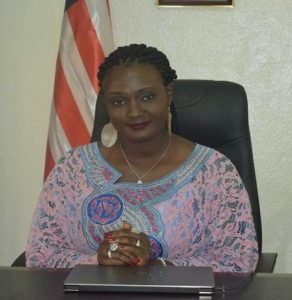
The United Nations Sustainable Development Goals (UN SDGs) were developed to address challenges such as this; SDG 1 – No Poverty; 2 – Zero Hunger; 5 – Gender Equality; 8 – Decent Work and Growth and 14 – Life Below Water all aim to ensure food and financial security for communities around the world. In this blog, we speak with Mrs. Emma Metieh-Glassco, Director General of Liberia’s National Fisheries & Aquaculture Authority, and the first woman to hold this position, to discuss the SDGs, sustainable fisheries and gender equality.
What attracted you to working in the fisheries sector?
I developed passion for the fisheries sector when I was given an opportunity to serve as a Fisheries Monitoring Consultant to a World Bank Regional Fisheries Project in 2012.
While participating in joint Sea and Aerial Patrol conducted by Fisheries and Coast Guard of Liberia, I conducted daily monitoring and reporting through satellite software vessel monitoring system of fishing vessels operating in Liberia’s territorial waters as well as obtaining detailed information on suspected Illegal Unreported Unregulated (IUU) fishing activities for prosecution.
This experience indeed built my enthusiasm and anxiety to pursue an MSC at the World Maritime University in Malmo, Sweden, with specialization in Ocean Sustainability Governance and Management.
It was from this backdrop that I became more attracted to the Fisheries Sector, which is perceived to be a male-dominated sector.
Being a woman, I am proud to have the opportunity to serve at the highest managerial and administrative level, thus presenting the perfect opportunity to increase the visibility of women who have been marginalized within the sector.
I believe this is an opportunity to make a change and we will exert all efforts to have a significant impact. My passion to act is based on a combination of things I witnessed as a child growing up in a society where nothing was taken for granted. My parents instilled in me the discipline of hard work. This is the motivation pushing me to make the sector a viable alternative for economic growth and development.
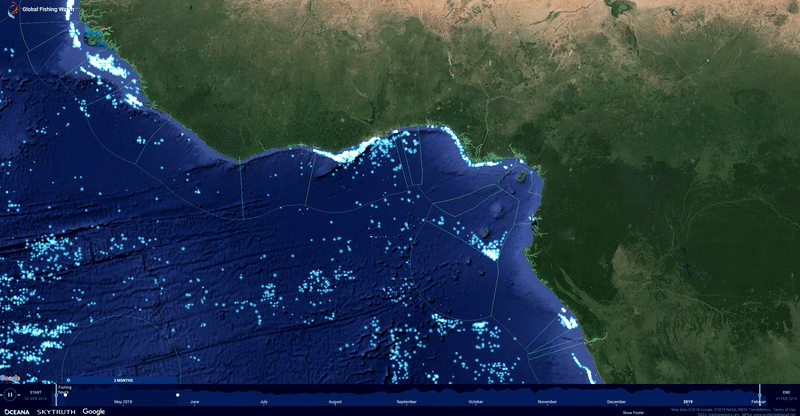
How has the role of women in fisheries changed in Liberia since you have been working in the sector?
When I took up this role as the Director General of the National Fisheries and Aquaculture Authority in Liberia, it was a major step in shifting the role of women in fisheries, especially at the highest managerial and administrative level. It was a change to the status quo of the male dominated sector. In Liberia, fisheries has always been dominated by men, especially going to sea, while women are left to do the processing, preservation, sales, marketing and distribution including making and mending baskets as a traditional practice. However, we have made some interventions, for example, for the first time since the 1980s, we conducted a seaman training and a woman participated and was certificated to become a professional seafarer. It is a step forward.
Additionally, women have gradually begun to gain viability within the fisheries sector. For instance, our data have shown that there are a few women owning fishing vessels instead of only being involved with the processing and marketing of the fishermen catch. They have been organized into cooperative such as Fish Mongers Association so as to obtain the relevant recognition and form part of the decision-making process on matters relating to the sector. With aid from partners such as ATLAFCO, and the Icelandic government, this association also benefits from several programs which include training in improved smoking techniques and fish handling. Currently we are conducting studies on other livelihood improvement. As part of this project, they will be benefiting from a microcredit program, under the enhancing livelihood component.
How is Liberia working to implement SDG 14?
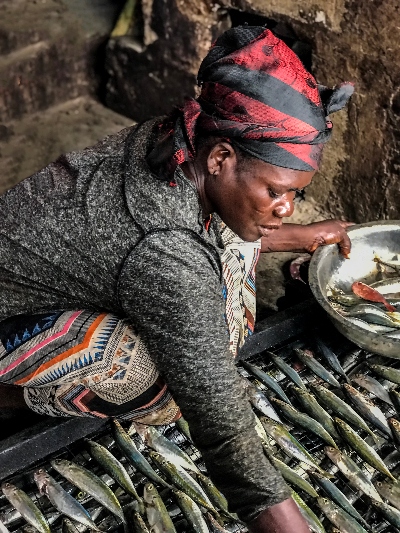
As a member State to the UN, we have integrated the UN Sustainable Development Goals into all our National development programs, Pro-poor Agenda for Prosperity and Development (PAPD). The government of Liberia, through the National Fisheries and Aquaculture Authority (NaFAA), is a contracting party and cooperating non-contracting party to some Regional Fisheries Management Organization (RFMOs), as well as the United Nations Fish Stock Agreement (UNSFA) and the United Nations Convention on the Law of the Sea (UNCLOS). Also, Liberia implements protocols and provisions from FAO Code of Conduct on Responsible Fishing, National Plan of Action Against Illegal and Unreported Unregulated Fishing Activities (NPOA-IUU), amongst others.
Moreover, in an effort to implement SDG 14, the government of Liberia, through the NaFAA, has also instituted stronger regulatory regime by recently legislating its first Fisheries and Management Development law in November of 2019, thereby maintaining Inshore Exclusion Zone (IEZ) at 6 Nautical Miles (6NM) for the purpose of conserving marine resources as well as protecting the livelihood of the artisanal sector which tends to strengthen food security. Developing a strong legal framework will set the basis to ensure that the marine resources of Liberia are conserved and sustainably managed for long term economic benefit. Also, as an international best practice, Liberia has a Quota Licensing Management Regime backed with licensing policy to prevent overfishing.
We have also introduced Cooperative Management Associations, a community-based approach to manage the fisheries sector along with the local fishers and have developed a robust Monitoring Control and Surveillance (MCS) Program. The MCS program entails 100% scientific observer coverage, inspectorate program (dockside and portside), mandatory vessel monitoring system (VMS) installation on fishing vessels, amongst others. All these measures are put in place to help deter IUU fishing activities and to sustainably manage and conserve our marine resources which is consistent with UNSDG14.
Additionally, we have ratified, acceded and implemented several international instruments, such as FAO Port State Measure Agreement, National Plan of Action on IUU, and ICW Convention, in order to sustainably manage the sector and resources.
What are some of the challenges you regularly face when directing Liberia’s National Fisheries & Aquaculture Authority?
In a male-dominated society like Liberia, it is sometimes difficult as a woman to get your points through. At most times, it takes a lot of lobbying to get interagency collaborations. However, we have handled this well and are currently enjoying appreciable collaboration with related agencies in the sector and the country’s Leadership.
Also, we have had challenges in attracting potential investors that will industrialize the sector. This is because we are in the process of developing systems and standards consistent with international best practices. Some areas of shortcoming in Liberia’s fishing sector include fisheries laboratory and fishing infrastructure.
However, there are efforts underway with the assistance of developing partners such as the World Bank, EU, USAID, Government of Iceland, etc, to address these challenges. Liberia has very rich stocks especially demersal species, shrimps, crustacean and cephalopods. According to the latest FAO Nansen Survey (2019) conducted in the region, Liberia maintains the healthiest demersal stocks. Industrial investment in these fish stocks will provide significant economic boost to the sector and country.
What information do you need from foreign-flagged fishing vessels to ensure they remain in compliance with Liberia’s fisheries regulations?
Foreign flagged vessels will need to provide all the information as outlined in the requirement for operating in Liberian waters, as listed in our Fisheries Law of 2019, which is on the website of National Fisheries and Aquaculture Authority; www.nafaa.gov.lr.
The Vessels will have to provide details on the entire vessel specifications, which will include the length, GRT, size, description, IMO number, Call sign, gears specification, method of fishing, crew nationality, and previous fishing history, etc. to the National Fisheries and Aquaculture Authority of the government of Liberia.
These pieces of information will be processed and due diligence will be conducted especially with RFMOs.
How do you think increased fisheries transparency would assist you in ensuring sustainable development of Liberia’s fisheries and fisheries in the region?
Liberia is a member of many regional fisheries management organizations such as International Commission on the Conservation of Atlantic Tuna (ICCAT), Fisheries Committee for the West- Central Gulf of Guinea (FCWC), Conference on Fisheries Cooperation Among African States (ATLAFCO) etc, that requires basically sharing of information for a sustainable management of the fisheries resources in the region. Liberia’s active participation in these organizations has a significant impact in the management of the Fisheries sector. The impact has been beneficial to Liberia especially in areas of information sharing, capacity building and a collaborative fight against IUU. Information sharing and transparency have enabled the regional management bodies ascertain information and provide professional expertise to countries that will need to strengthen its fisheries management and governance structure and also implement National and international laws.
Increased fisheries transparency has strengthened collaborations in tackling major impediment that will hinder the growth of the sector as well as the socio-economic development of the people. This provides an opportunity to develop a regional approach of intelligence sharing which will address issues like IUU, human trafficking, drug smuggling, etc. Increased fisheries transparency leads to greater treaty regimes, which enhances compliance and better management of the fisheries.
Similarly, to other post-Rio agreements, the U.N. Fish Stocks Agreement contains provisions intended to facilitate broad public participation and transparency in its administration and implementation. Article 12 sets out a framework for transparency and public participation in the activities of sub-regional and regional fisheries management organizations and arrangements. Non-governmental organizations that are concerned with straddling and highly migratory fish stocks “shall have timely access to the records and reports” of RFMOs. Member states are required to provide for transparency in the decision-making process and other activities of the RFMO. Moreover, representatives from concerned NGOs are to be afforded the opportunity to take part in RFMO meetings and influence some level of decision making to enhance transparency in the fisheries management processes.
An increasingly important function of public participation is supplementing the capacity of state parties to monitor and enforce compliance with treaty commitments once a multilateral environmental or fisheries resource management agreement has entered into force. Nongovernmental organizations and individuals can act as independent fact-finders and analysts, identifying incidences of non-compliance and ways to improve reporting and accountability mechanisms requires basically sharing of information for a sustainable management of the fisheries resources in the region. Liberia’s active participation in these organizations has had a significant impact in the management of the fisheries sector. The impact has been beneficial to Liberia especially in areas of information sharing, capacity building and a collaborative fight against IUU. Information sharing and transparency have enabled the regional management bodies ascertain information and provide professional expertise to countries that will need to strengthen its fisheries management and governance structure and also implement national and international laws.
Improving fisheries transparency will provide a cost-effective solution for regions such as West Africa to monitor fishing activity, prioritize enforcement efforts and improve the sustainability of fisheries needed to support the thousands of women working in the sector – sustainable fisheries that will ultimately contribute to achieving gender equality and empowering women in the region.
